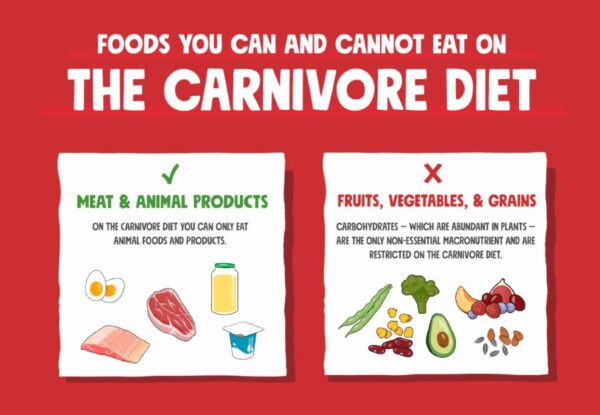The Carnivore Diet is one of the most controversial and talked-about diets today. This all-meat diet plan has gained popularity in recent years, particularly among individuals seeking to lose weight, enhance mental clarity, and even alleviate certain health conditions. But what exactly is the Carnivore Diet (High-protein diet or Animal-based diet), and does it offer the benefits its followers claim?

In this article, we’ll break down everything you need to know about the Carnivore Diet, including its benefits, potential drawbacks, and tips for getting started.
What Is the Carnivore Diet?
The Carnivore Diet is a restrictive eating plan that consists solely of animal products. Unlike the ketogenic diet, which allows some plant-based foods like leafy greens and nuts, the High-protein diet is much stricter, eliminating all plant-based foods. Essentially, it’s a zero-carb diet that focuses on eating only meat, fish, eggs, and some animal fats. Dairy is sometimes included, depending on the individual’s tolerance.
At its core, an animal-based diet encourages a high intake of proteins and fats, with no room for carbohydrates, vegetables, fruits, grains, or sugars. Followers of the diet believe that humans are optimized to eat animal foods, and they often claim that it can lead to weight loss, increased energy, and improved overall health.
How the Carnivore Diet Works
The Carnivore Diet operates on the principle that the body doesn’t need carbohydrates or plant-based foods to thrive. Instead, it relies solely on proteins and fats to fuel the body. Here’s how it works:
- No Carbohydrates: Carbs are eliminated, meaning no bread, pasta, rice, fruits, vegetables, or grains.
- Protein and Fat: The diet is primarily composed of fatty cuts of meat, such as steak, pork, and lamb, as well as other animal products like eggs and fatty fish.
- Ketosis: Like the ketogenic diet, the animal-based diet may put your body into a state of ketosis, where it burns fat for fuel instead of carbohydrates. However, the goal here is to rely entirely on animal-based sources of energy.
Foods You Can Eat on the Diet
When following the Animal-based diet, your food choices are limited to animal-based products. Here’s a breakdown of the typical foods that are allowed:

- Meat: Beef, pork, lamb, poultry, and game meats like venison or bison are the staples of the Carnivore Diet.
- Fish: Fatty fish like salmon, mackerel, and sardines are commonly consumed.
- Eggs: Eggs are a good source of protein and fat and are often included in Animal-based diet meals.
- Animal Fats: Butter, lard, tallow, and other animal fats are encouraged as cooking fats or for drizzling over meals.
- Organ Meats: Liver, kidney, and heart are rich in vitamins and minerals and are frequently recommended.
- Dairy (optional): Some people on the High-protein diet include dairy products like cheese, butter, and cream, but others avoid them due to lactose intolerance or other sensitivities.
Foods to Avoid on the Diet
Since the Animal-based diet focuses on animal products, you’ll need to avoid any foods that come from plants. Here’s what to cut out:
- Fruits: All types of fruit are excluded, including berries, apples, bananas, and citrus.
- Vegetables: Leafy greens, root vegetables, and legumes are all off-limits.
- Grains: Wheat, rice, oats, quinoa, and all other grains are eliminated.
- Nuts and Seeds: Even healthy snacks like almonds, walnuts, and sunflower seeds are not allowed.
- Sugar and Sweeteners: No sugar, honey, maple syrup, or artificial sweeteners.
Health Benefits
Proponents of the High-protein diet often point to a variety of health benefits that come from cutting out all plant-based foods. Let’s take a closer look at some of the potential advantages of following this meat-heavy eating plan.
1. Weight Loss
One of the primary reasons people turn to the Carnivore Diet is for weight loss. By eliminating carbs and relying on protein and fat, the body shifts into a fat-burning mode, similar to what happens on a ketogenic diet. Many followers report rapid weight loss due to the satiating effects of protein, which helps reduce hunger and control cravings.
2. Reduced Inflammation
Some proponents claim that the Animal-based diet can help reduce inflammation, especially in people who are sensitive to certain plant compounds, such as lectins or gluten. Animal-based foods are typically low in inflammatory compounds, which could contribute to an overall reduction in inflammation in the body.
3. Improved Mental Clarity and Focus
Another reported benefit of the High-protein diet is improved mental clarity and focus. By eliminating carbohydrates, the brain burns ketones for fuel, which may improve cognitive function. Many individuals on the diet claim to experience sharper focus and fewer brain fog episodes.
4. Better Digestive Health
Some people with digestive issues, such as irritable bowel syndrome (IBS) or bloating, find relief when they switch to the Carnivore Diet. Since this diet eliminates all plant fibers and sugars, which can be hard for some people to digest, it may result in less digestive discomfort and improved gut health.
5. Simplified Meal Planning
For those who find meal planning stressful or overwhelming, the Animal-based diet can simplify things. With a limited variety of foods allowed, meal choices are straightforward. You don’t have to worry about counting calories, tracking macronutrients, or planning complex meals.
Potential Drawbacks of the Carnivore Diet
While this Diet has potential benefits, it’s important to acknowledge that it comes with some risks and challenges.
1. Nutrient Deficiencies
Because the High-protein diet eliminates all plant-based foods, followers may miss out on essential nutrients found in fruits, vegetables, and grains. For example, vitamin C, fiber, and certain antioxidants are absent from the diet, which can lead to long-term health problems if not carefully monitored.
2. Lack of Variety
The Carnivore Diet is extremely restrictive, which may lead to boredom or burnout over time. Eating the same types of foods day in and day out can become monotonous, making it harder to stick with the diet in the long run.
3. Digestive Issues
While some people report better digestion on the High-protein diet, others may experience constipation or digestive discomfort due to the lack of fiber. Fiber plays a crucial role in digestive health, and its absence in the Carnivore Diet can cause issues for some individuals.
4. Health Risks of a Carnivore Diet
Some health experts express concern about the long-term effects of consuming large amounts of red meat, which has been linked to an increased risk of heart disease, certain cancers, and high cholesterol. Without the balance of plant-based foods, the Animal-based diet may not provide the variety of nutrients needed for optimal health.
How to Get Started on the Carnivore Diet
If you’re considering trying this Diet, here are a few tips to help you get started:
1. Ease Into It
For those new to the Carnivore Diet, it can be helpful to ease into it gradually. Start by cutting out processed foods, sugars, and grains before eliminating all plant-based foods.
2. Focus on Quality Meat
Since meat is the main component of the Carnivore Diet, it’s essential to prioritize high-quality, grass-fed, and pasture-raised meats when possible. These options are often higher in omega-3 fatty acids and other beneficial nutrients compared to conventionally raised meats.
3. Stay Hydrated
Drinking enough water is crucial, as the absence of carbohydrates means your body won’t retain water as effectively. You might also want to consider supplementing with electrolytes, especially if you’re experiencing symptoms of the “keto flu,” such as headaches or fatigue.
4. Monitor Your Health
Since the High-protein diet can be restrictive, monitoring your health regularly is important. Consider working with a healthcare provider to track your nutrient levels and ensure you’re staying healthy.
Final Thoughts on the Carnivore Diet
The Animal-based diet is a unique and highly restrictive eating plan that eliminates all plant-based foods and focuses solely on animal products. While it offers potential benefits like weight loss, improved mental clarity, and reduced inflammation, it also comes with risks such as nutrient deficiencies and digestive issues.
If you’re considering adopting this Diet, it’s important to research, consult with a healthcare professional, and carefully monitor your health along the way.

